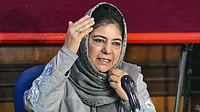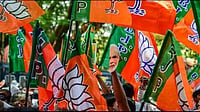Expecting elections in Jammu and Kashmir, National Conference (NC) on Wednesday issued a list of constituencies’ in-charge of Kashmir Valley, setting speculations that the nominees are the candidates of the party when elections will be announced for J&K.
The party president Dr Farooq Abdullah and Vice President Omar Abdullah are not on the list, indicating they are not contesting the polls and it is consistent with their political stand.
In 2020 after his release from prolonged detention, Omar Abdullah had said he will not contest assembly elections till J&K remains a Union Territory. Omar argued that he had been a leader of the state, and it was the most empowered assembly in the country and that he cannot and will not be a member of what is now one of the most disempowered assemblies in the country.
The list of 47 Constituency Incharges of the Valley was approved by NC president Dr Farooq Abdullah and released to the media by Party General Secretary Ali Mohammad Sagar.
The order, released by Sagar, also asked the office bearers in constituencies to coordinate with their respective Constituency In-charges and ensure full support to them, a party spokesperson said. “The order also enjoined respective Incharges to remain in regular touch with the public, party workers, and block and Halqa office bearers for making the party stronger at the grassroots level,” Sagar said.
NC Chief spokesperson and adviser to Omar Abdullah, Tanvir Sadiq told Outlook these are constituency incharges and with the new delimitation, this was needed to ensure better coordination between the new and old constituencies in the organisational structure. “This new arrangement does not necessarily mean that the in-charges will be candidates because elections have not been announced. This is an internal arrangement,” said Abdullah.
However, the People’s Alliance for Gupkar Alliance (PAGD) is reading the move differently, seeing this as a message from NC to its internal party elements that this is how the party will proceed whenever elections are held. At the same time, the party has also conveyed that it is open to the alliance in Jammu as the party has not nominated constituency in-charges here, but it has closed doors for any alliance in Kashmir.
PAGD was created on October 20, 2020, after six political parties, National Conference, Peoples Democratic Party, CPI(M), Awami National Conference, Peoples’ Conference and Peoples’ Movement, came together to struggle peacefully and politically for the restoration of the special status of Jammu and Kashmir, revoked on August 5, 2019. The alliance pushed the BJP to the margins in J&K in the district development polls held in November-December 2020. It fought the DDC polls jointly on individual party symbols and won an impressive 110 seats of the total 280 constituencies. The BJP was expecting to sweep the polls but could not move beyond the Hindu heartland of the Jammu, Kathua, Udampure, and Samba districts.
PAGD received a jolt in January last year with its spokesman Sajad Lone deciding to withdraw his Peoples’ Conference from the group. At that time PAGD chairman and senior CPI (M) leader Mohammad Yousuf Taragami had said the PAGD agenda was not confined to the elections. “It was beyond the polls. The DDC polls were thrust upon the PAGD and it accepted the challenge. Our critics don’t realise that our mandate is beyond DDC polls."
In March this year, Home Minister Amit Shah said J&K assembly elections will be held once the delimitation exercise is over and after consultation with political parties. “We have no interest in keeping Jammu and Kashmir under President’s Rule,” Shah said in Lok Sabha while responding to concerns raised by members on Kashmir during the discussion.
Jammu and Kashmir has been without Legislative Assembly since November 2018 when the then the legislative assembly was dissolved by then-governor Satya Pal Malik after the PDP leader Mehbooba Mufti staked a claim to form the government. The governor’s rule was imposed in J&K in June 2018 after the BJP pulled out of the Mehbooba Mufti-led PDP-BJP coalition government.
For the past two years, the BJP leaders have been saying the elections in J&K will be held after the Delimitation Commission completes its exercise and gives its report. On May 6 this year, Delimitation Commission finalised its two yearlong exercises recommending the creation of six additional assembly constituencies in the Jammu region and one more in the Kashmir Valley. The delimitation commission’s report is widely criticised in J&K and is being described as the BJP’s gerrymandering move, creating a rift between communities and regions for electoral gains. Still, the regional political parties were hoping that after the report the ECI will announce the polls in J&K. But it is not happening. The ECI, however, started work on the revised voter list and the process continues.
While Gujarat and Himachal Pradesh elections are announced, many J&K political parties are expecting a poll announcement here.


























